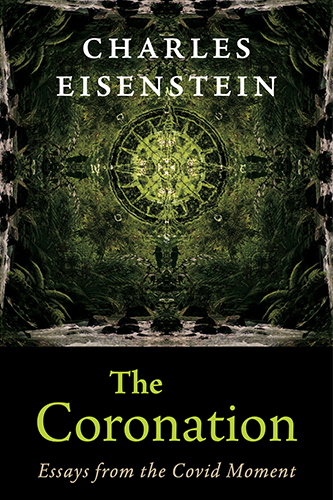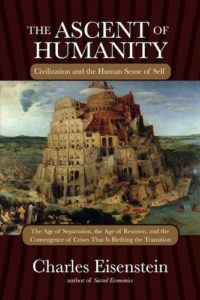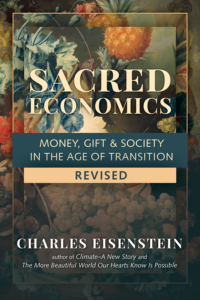The More Beautiful World Our Hearts Know Is Possible
Chapters
Chapter 22: Struggle
When is the right time to do the right thing? No one can offer a formula to answer that question, because the rhythm of the phases of action and stillness has an intelligence of its own. If we tune in, we can hear that rhythm, and the organ of perception is the desire, the nudge of excitement or the feeling of flow, of rightness, of alignment. It is a feeling of being alive. To listen to that feeling and to trust it is a profound revolution indeed. What would the world be, if we all listened to that?
This kind of deep self-trust highlights the common habit of separation that is its opposite: the habit of struggle. In the old story, just as humanity as a whole is destined to conquer and rise above nature, so are we as individuals charged to conquer and rise above that bit of nature that we call the body, including pleasure, desire, and every physical limitation. Virtue comes from self-denial, willpower, discipline, self-sacrifice. Mirroring the war against nature, this war against the self can have only one result: you lose.
A corollary principle of self-struggle is to elevate anything that is hard and devalue anything that comes easy. It is therefore also a habit of scarcity and of ingratitude. Imagine you are a practitioner of meditation and someone asks you, “What do you do?” You reply, “Well, I sit on a cushion and pay attention to my breath.” The questioner says, “That’s all? What’s so hard about that?” “Oh,” you say, offended, “it’s really hard!” Being hard validates it. To do it, you have to overcome something in yourself; you have to prevail in some kind of struggle.
I realize that the paradigm of struggle is something that quickly falls by the wayside as one pursues the practice of meditation. Maintaining focus on the breath cannot happen through forcing, but only through allowing. In fact, it is extremely easy; our habit of making things hard is what gets in the way. Nonetheless, we often use “easy” as a term of disparagement, as in “She took the easy way out.”
The belief that goodness comes through sacrifice and struggle goes back thousands of years—but only thousands of years. It is the defining mentality of agriculture: only if ye sow, shall ye reap. The ancient peasant had to learn to overcome the immediate urges of the body for the sake of a distant future reward. Just as it takes a lot of work to overcome nature (for example by clearing fields, pulling weeds, etc.) so also does it take work to overcome human nature: the desire perhaps to play, to sing, to roam, to create, and to seek food only when hungry. Agricultural life requires sometimes overcoming these desires.
In tracing the deep roots of this programming, I fear I am overstating the case. The transition from hunting and gathering to agriculture was not a sudden rupture, either in lifestyle or in psychology. Foragers are not without forethought; they might move to a food-rich area or go on a hunt even if they are not at that very moment hungry. And small-scale farmers enjoy plenty of leisure, and their work need not be tedious or exhausting or anxiety-driven. Gardening, many of us know, can be a pleasure and a joy. So really the origin of the valorization of self-conquest probably came later, with the first “builder” civilizations. Their high degree of division of labor, standardization of tasks, hierarchy, and other regimentation necessitated the virtues of discipline, obedience, sacrifice, and the work ethic.
These civilizations developed the conceptual and organizational basis for the Industrial Revolution, which took division of labor, standardization of processes, and the attendant degradation, exploitation, and tedium to new heights. It was then as well that the values of the machine achieved their full expression. Society required millions of people to do very hard things indeed. We devised numerous institutions to compel ourselves to sacrifice the present for the future. Religion taught us to do that: renounce and overcome fleshly desires for the sake of a heavenly reward in the afterlife. School taught us to do that, conditioning us to perform tedious tasks we really don’t care about for the sake of an external future reward. And, most of all, money taught us to do that, or, more often, compelled us to do that, through the devices of interest and debt. The former tempts the investor to forgo immediate gratification (or generosity) for the sake of even more in the future. The latter compels the equivalent of the debtor.
These social institutions reified the struggle contained in our basic scientific paradigms. Not only in Darwinian biology with its struggle to survive, but in physics as well with the doomed and endless struggle against entropy embodied in the Second Law of Thermodynamics, we reside in a hostile universe in which we must overcome natural forces and carve out a realm of security, and apply force to impose our design on a purposeless, disorderly jumble.
You can see how intertwined are the habits of scarcity and the habits of struggle. On the economic level, it is scarcity that motivates and compels sacrifice. On the psychological level, the need to validate oneself through (paradoxically) self-conquest comes itself from another form of scarcity: “I’m not good enough.” And both scarcity and struggle are implicit in our basic concept of being. The separate self can never have enough: never enough power to stave off every threat from the arbitrary, merciless forces of nature; never enough money to ensure against every possible misfortune; never enough security to defeat death, which, for the separate self, means total annihilation. At the same time, in striving for money, power, and security at the expense of other beings, the separate self is essentially evil; only by self-conquest, self-sacrifice, can it act in the interests of other beings. In the face of this desolation, it is easy to see the appeal of an otherworldly realm of spirit, a place where our perpetual sacrifice is redeemed.
In this world, the world of separation, the sacrifice is indeed perpetual. The debtor lives it. The investor leverages it. The schoolboy learns it. When will we wake up from that delusion and enjoy life?
The awakening will be profound, because the habit of struggle is woven so intricately into modern life that we hardly distinguish it from reality itself. We take it for granted that if one doesn’t exercise some self-restraint, then both oneself and society will suffer. It sure does seem that if you don’t restrain your appetite for food, you will become overweight; that if you don’t limit your propensity to lounge around, you will never get anything done; that if you give free rein to your temper, you will yell at people; and so on. Desire is not to be trusted! What if your desire is to eat a dozen donuts? Go on an alcoholic bender? Sleep in every day until noon? Shout and hit and rape and kill? Well, maybe you are better than some people—maybe you don’t have a desire to do those things. Or maybe you exercise more self-restraint. More than the obese, the addicts, the criminals, the child abusers, the murderers.
A later chapter will deal with the habit of judgment that, among other things, holds oneself different from and superior to those who are slaves to their desires. Here I want to meet head-on the perception that it is unrestrained desire that destroys our lives and, in the form of consumerism and greed, is destroying the rest of life on Earth. It sure can seem that way. It behooves us to be suspicious of that appearance, though, simply because of how seamlessly it fits in with the internalized War on Nature and the Story of Control. Is there another way to understand it that doesn’t invoke a war against the self?
One time after a talk in England a young woman asked me if I flew around giving a lot of speeches. “Yes,” I replied.
She then asked, “How do you justify that?”
“What do you mean?”
She began to explain about the carbon footprint of air travel, at which point I interrupted, “Oh, I don’t justify it. I do it because it makes me feel alive, it gives me pleasure. I do it because I like it.” I went on to say, “Now I could concoct a justification if you like. Maybe I could say that I believe the overall effect of my flying and speaking, which sometimes changes the course of people’s lives, outweighs the carbon dioxide produced as a result of my air travel. Maybe some people will hear me and choose a career in permaculture rather than tax law. Maybe they will have the courage to live a life that will contribute to an ecological society. But even though I think this is true, I would be lying to you if I said that is my justification. The real reason, the truth, is that I do it because I like it.”
The woman was aghast. “You are completely amoral,” she said. “By that logic, you could do anything you like, just because you feel like it. You could justify eating animal flesh, sacrificing the life of a sentient being for the sake of some transitory mouth pleasure. You could justify murder, if you ‘felt like doing it.’ Surely you can’t be serious. You can’t be telling people to just do whatever they want!”
“Yes, that is exactly what I am doing,” I answered. The conversation proceeded no further, but I will continue it now. It will become clear that “Do whatever you want” very quickly leads to the realization that we do not actually know what we want. And, what we have been told about the natural objects of desire is a fiction.
What, exactly, is the problem with doing whatever I want, or doing whatever feels good? Why do we make a virtue of self-restraint?
If what we want is destructive to self and others, then indeed it would be awful to encourage people to just do what they want. If John Calvin was right about the total depravity of man, if human progress is indeed an ascent from a state of bestial savagery, if nature is at bottom a war of each against all and human nature is to win that war by any means necessary, if human beings are ruthless maximizers of rational self-interest, then yes, we must conquer desire, conquer the flesh, and transcend pleasure, conquering inner biological nature just as we conquer the outer, becoming the Cartesian lords and possessors of ourselves as well as of the universe.
That is the old story. In the new story, no longer are we at war with nature and no longer do we seek to conquer the self. We discover that desire has been so destructive because we have been misled. The things we think we want are often substitutes for what we really want, and the pleasures we seek are less than the joy that they distract us from. From the normal vantage point, it certainly seems that only with discipline can we withstand the temptations that surround us: overeating, drugs, video games, mindless internet surfing, and everything else we consume. These things are undeniably destructive to our own lives and beyond; therefore, it would seem, we cannot always trust desire at all. But when we recognize that these are not really what we desire, our goal becomes not to suppress desire but to identify the true want or need, and to fulfill it. That is no trivial task; it is a profound path of self-realization.
Desire comes from unmet needs. That is a fundamental precept of self-trust. One expression of the War against the Self that mirrors the War against Nature and the program of control is to allow the meeting of one’s needs while limiting the “selfish” fulfillment of one’s desires. That is part of the old story. It leads not only to self-rejection, but also to judgmentality. I limit the fulfillment of my desires, but they don’t. How selfish of them. They should exercise restraint. They should exercise discipline. And if they do not, if they are just plain selfish people and don’t have it in them, why, then we will have to force them to behave less selfishly through incentives and rules, rewards and punishments. We will have to impose a program of control.
In the new story, we look for the unmet need that drives the desire. This is a powerful transformative tool not only for personal development, but also, as I will explain, for social change. When we address the unmet need directly, it no longer drives the desire that had been so destructive. Fail to address the need, and the boiler that drives the desire keeps building pressure. Addiction and the gratification of superficial desires are like a release valve. When we clamp down on it with willpower, the pressure builds and eventually explodes out, perhaps as a binge, or, if the old expression of the desire is rendered unavailable, then as a new addictive behavior. This explains the common phenomenon of “addiction transfer” among recipients of bariatric surgery. Unable to overeat, they often take up drinking, gambling, or compulsive shopping.
The futility of the War against the Self mirrors the futility of war in general, which always leaves the deep causes of the provoking situation untouched. The only exception would be if a nation or its leaders were just plain bad. If they are irredeemable, then force is the only solution. Similarly, if your bad behavior comes from an innate badness, an inherent elemental depravity within you, then it would also be true that the only solution would be to subdue it.
That logic leads eventually to despair, because what happens if you try to subdue it and fail? What happens if that depraved part of you is too strong, stronger than any force you can muster to subdue it? What happens when this part of yourself runs your life? What happens when the seemingly bad people run the world? As any addict can tell you, force is insufficient in the face of a much stronger force. The despair of the dieter, trying to overcome the force of desire, and the despair of the activist, trying to overcome the force of the consumptive powers that rule the world, are identical. We all wrestle the same demon in a myriad of different forms. Fortunately, our perception of the origin of the violence, greed, etc., is mistaken, as, therefore, is the remedy of force.
Endnotes:
21. This phenomenon is controversial; some authorities say it doesn’t exist, while others give a rate of 5–30 percent. A bariatric surgeon I know personally and who meets with patient groups post-surgery has told me he thinks the figure is closer to 90 percent.
22. Let me qualify that. Force, like all things, has its proper role. I would not suggest that a recovering alcoholic abandon his disciplined commitment to not drink today. Neither would I suggest that we refrain from using force to stop a gunman on a rampage, or a massacre that is in progress. When we understand that these solutions don’t reach the root of the problem, we won’t be tempted to apply them in place of real healing.






